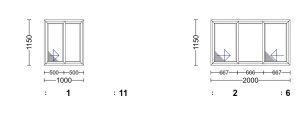Aluminium Door profile thickness

Aluminium is a popular choice for doors due to its strength, durability, and low maintenance. However, one important factor to consider when choosing an aluminium door is the thickness of the door profile. The thickness of an aluminium door profile can affect its strength, durability, and energy efficiency. In this article, we will explore the importance of aluminium door profile thickness and what you need to know to make an informed decision.
Aluminium Door Profile Thickness Explained
The thickness of an aluminium door profile is measured in millimetres (mm) and refers to the depth of the frame. Aluminium door profiles are typically available in a range of thicknesses, including 30mm, 40mm, 50mm, and 60mm. The thickness of the profile will determine the overall strength and durability of the door, as well as its energy efficiency and sound insulation.
A thicker profile will generally provide greater strength and durability, as well as better energy efficiency and sound insulation. Thicker profiles are also able to accommodate larger glass panels, allowing for greater natural light and a more expansive view. However, thicker profiles are generally more expensive than thinner ones.

Why is Aluminium Door Profile Thickness Important?
The thickness of an aluminium door profile is important for several reasons. First and foremost, it determines the strength and durability of the door. A thicker profile will be able to withstand more wear and tear and is less likely to warp or bend over time. This is especially important for doors that will be exposed to harsh weather conditions, such as strong winds or heavy rain.
Secondly, the thickness of the door profile can impact its energy efficiency. Thicker profiles generally provide better insulation, helping to keep your home warmer in the winter and cooler in the summer. This can result in lower energy bills and a more comfortable living environment.
Finally, the thickness of the door profile can affect its sound insulation properties. Thicker profiles are generally better at blocking out external noise, providing a more peaceful and quiet living environment.

Choosing the Right Aluminium Door Profile Thickness
Choosing the right aluminium door profile thickness will depend on several factors, including your budget, the location of the door, and your personal preferences. Here are some key factors to consider when choosing an aluminium door profile thickness:
Location of the Door: The location of the door will play a significant role in determining the appropriate thickness of the door profile. For example, doors that are exposed to harsh weather conditions, such as strong winds or heavy rain, may require a thicker profile to ensure greater strength and durability.
Budget: The cost of an aluminium door will typically increase with the thickness of the profile. Thicker profiles are generally more expensive than thinner ones. Consider your budget when choosing a profile thickness.
Energy Efficiency: Thicker profiles generally provide better insulation, which can result in lower energy bills and a more comfortable living environment. Consider the climate in your area and your personal preferences for energy efficiency when choosing a profile thickness.
Sound Insulation: Thicker profiles are generally better at blocking out external noise, providing a more peaceful and quiet living environment. Consider your location and your personal preferences for sound insulation when choosing a profile thickness.
Aesthetics: The thickness of the door profile can impact its appearance. Thicker profiles are generally more substantial and may provide a more contemporary or industrial look. Thinner profiles may be more appropriate for a minimalist or modern design.

Conclusion
The thickness of an aluminium door profile is an important consideration when choosing a door. It can impact the strength, durability, energy efficiency, and sound insulation of the door. Thicker profiles generally provide greater strength and durability, as well as better energy efficiency and sound insulation. However, they are also generally more expensive than thinner profiles. Consider the location of the door, your budget, energy efficiency and sound insulation needs, and your personal preferences when choosing an aluminium door profile thickness.
It is also important to choose a reputable and experienced manufacturer for your aluminium door. A reputable manufacturer will be able to provide you with expert advice on the appropriate thickness of the door profile based on your specific needs and preferences. They will also be able to ensure that the door is manufactured to the highest quality standards and is installed properly for maximum performance and longevity.
In addition to choosing the right aluminium door profile thickness, it is important to also consider other factors such as the type of glass used, the locking system, and the finish of the door. These factors can also impact the performance, durability, and aesthetics of the door.
When it comes to the type of glass used in the door, consider factors such as energy efficiency, sound insulation, and security. Laminated glass is a popular choice for doors as it provides greater security and sound insulation than standard glass. Double or triple-glazed glass can also improve energy efficiency.
The locking system is another important factor to consider when choosing an aluminium door. Look for a locking system that is secure and meets the highest standards for security. A reputable manufacturer will be able to provide you with a range of locking options to choose from.
Finally
Finally, the finish of the door is also an important consideration. Aluminium doors are available in a range of finishes, including powder coating, anodising, and woodgrain finishes. Choose a finish that complements the style of your home and provides the durability and resistance to weathering that you need.
In conclusion, the thickness of an aluminium door profile is an important consideration when choosing an aluminium door. Thicker profiles generally provide greater strength, durability, energy efficiency, and sound insulation, but are also more expensive. Consider your specific needs and preferences, as well as other factors such as the type of glass used, the locking system, and the finish of the door, when choosing an aluminium door for your home. Choose a reputable manufacturer who can provide expert advice and ensure that your door is manufactured and installed to the highest quality standards for maximum performance and longevity.

